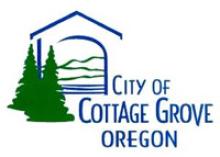Cottage Grove, Oregon, Looks to Bring Jobs to Town With Fiber Expansion
Cottage Grove, Oregon, is on the cusp of adding up to 250 new jobs with the aid of its fiber optic network. A recent Register-Guard.com article by Serena Markstrom details the potential project between the City and First Call Resolution. The company is interested in expanding to a Cottage Grove shopping strip. While the space is the right size and location, it does not have the needed telecommunications connections for a high-capacity call center.
The City is looking into expanding its fiber optic network to accommodate First Call. City leaders will seek a state economic development grant and recently approved funding for an engineer's construction plan to lay the cable to get an accurate cost estimate. Initial estimates are $450,000 for an entire underground installation. Council members have already suggested that the expansion makes sense, regardless of whether or not First Call becomes a tenant. The 7 miles of fiber are primarily located in the southern part of the city while the shopping strip is in the north.
The City Manager Richard Meyers hopes the added infrastructure will bring more than just First Call Resolution to the shopping strip. From the article:
The commercial strip being considered for the call center has much empty space. “The whole plaza needs help,” Meyers said. “We need to do something to see if we can get other things in there.”
If more businesses moved in and started leasing the cable, the city could collect money — just like any utility — from those who tapped into the network and use those funds to continue to expand fiber optic cable around town, Meyers said.
“With our fiber and what we’ve developed, we’re within 4,000 feet of connecting” to the Village Center, he said. “That’s how close we are,” he said. “It’s not a huge distance. We can do it. (It would be a) piece of cake to connect our system to his network and so all of [First Call Resolution's] call centers would be on the same network.”
The city network also offers a Wi-Fi network throughout 80% of the city. Rates vary, ranging from 10 free hours each month at 128 Kbps to 7 Mbps unlimited with tech support for $50 per month. According to the CGWiFi website:


